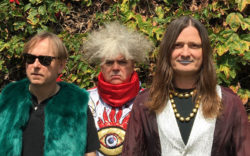“Shit’s gross here,” says Bambara‘s Reid Bateh. “You feel it in your throat; you sing differently.” He’s sitting outside a bar in the Bushwick neighborhood of Brooklyn, looking across the street at a squat, one-story warehouse. Its walls are smeared with black, bored-looking graffiti. Next to it, there’s another warehouse—also squat, also graffiti-smeared. Taking in these surroundings, it’s not hard to see what he means.
Bateh and his bandmates—William Brookshire and brother Blaze Bateh—came to New York City in the summer of 2011 after graduating from the University of Georgia. An upcoming album, DREAMVIOLENCE, out in April, emerged from this new chapter in the bandmembers’ lives, from their scramble to figure out day jobs, pay rent and adjust to life in another town. Before a recent gig at Williamsburg DIY venue Shea Stadium, the three discussed their move to the big city and its attendant worries and rewards.
“The interest was always there between us,” says Brookshire of the band’s decision to relocate. Even as early as high school, “ever since people started looking at colleges, the point was raised: New York City.” Brookshire, Bambara’s bassist, responds to questions with casual authority, as if he’d thought out his answers long before being asked. “We were all on the same page. There was really no hesitation. I don’t think we even talked about it—it was just, we finished up school and went to New York.”
Arriving in Brooklyn, the band found a readymade community of fellow former Athenians. Still, the three needed time to settle before they were able to focus on the band. “It [takes] a while to get jobs,” Reid notes, “and then you get ’em, and it takes a while to reach an equilibrium.”
Juggling three different schedules made it difficult to find time to record. Only at the beginning of last year was the band able to start in earnest. “I think once we finally got our bearings—after I got fired, really—is when we buckled down and got the record done,” says Reid. A short jobless stretch meant more unstructured time, or, at least, one less timetable to coordinate.
A new living situation also simplified things. “We moved into the same apartment,” says Blaze, the band’s drummer and the more energetic of the two brothers. Speaking of the band’s living arrangement, he sounds unfazed—cheery, even. “There’s six guys living there right now. Two floors. The basement is us; there’s three beds we sleep on [and] no walls. The other corner of the room is our studio where we recorded our album.”
“I’ve really learned how to share,” Brookshire remarks.
The songs on DREAMVIOLENCE reflect enforced intimacy and time constraints. “New York has kind of forced us to experiment with our songwriting style,” Blaze says. While before, the band would start recording with a song already written, here “it started with a texture or a weird loop.” The band’s process was to “get some sounds we like and then build it, layer on layer.”
DREAMVIOLENCE opens with a foreboding loop and creeping feedback. The bass comes in first: one note, repeated, in syncopated rhythm. The drums kick in a few measures later. After two verses at full force, the rhythm section falls out and there follows a more ambient stretch. What begins as a breakdown emerges as a full-fledged coda. The rhythm section regroups. Wreathed in atmospherics, pierced by recurring stabs of guitar, Reid’s voice intones, “We’re all the same.”
The band tends to favor a maximalist sound, and each song seems to pack in a dozen ideas. Much of the album’s impact comes from this sonic density, capped off by Blaze and Brookshire’s pulverizing rhythmic assault. But some of the most rewarding moments come at times when that density eases up, like on “Hawk Bones.”
In that song, amid the swung rhythm, a space opens—just enough room for entry. Inside, the listener can pick out some of the layers Blaze talks about. A haunting guitar part echoes around Brookshire’s melodic, buoyant bass line. Reid’s urgent baritone builds tension, which finally breaks into the chorus, where the guitar parts that have been skipping across the surface coalesce into a fully anthemic melody.
“Nail Polish” impresses in much the same way. “Train Daze” sees the band taking an even more pared-down approach, allowing Reid’s vocal melody to carry the song. Throughout, the album features stretches of unadorned ambient sound, which act as counterpoints to the intensity elsewhere. Reid has also explored this type of sound in a solo project, Feverer, but the success of these moments on DREAMVIOLENCE shows how seamlessly the band has incorporated these ideas.
After recording DREAMVIOLENCE, the band gave the record over to local engineer Joel Hatstat for mastering. Indeed, ties remain strong between Bambara’s old town and the “Athens refugee camp in Bushwick,” as Blaze describes it.
As for life in New York, the band seems to have settled into a good working rhythm. Day jobs are enough to sustain them, for now. (“We’re all working to live, not dying for the promotion,” says Brookshire.) The band also stays busy with other endeavors, including Blaze’s legitimately hilarious web series “The Blaze & Alex Show.” And later this year, there are plans to record again, in the same basement studio, with the three mattresses and the nonexistent walls.
It may be gross, but there’s no beating the arrangement for convenience. “It’s nice having everything there,” Blaze says. “The drum kit’s literally right next to my bed.”
WHO: Bambara, Manray, Muuy Biien, The Powder Room
WHERE: Caledonia Lounge
WHEN: Friday, March 22
HOW MUCH: $6 (21+), $8 (18-20)
Like what you just read? Support Flagpole by making a donation today. Every dollar you give helps fund our ongoing mission to provide Athens with quality, independent journalism.










